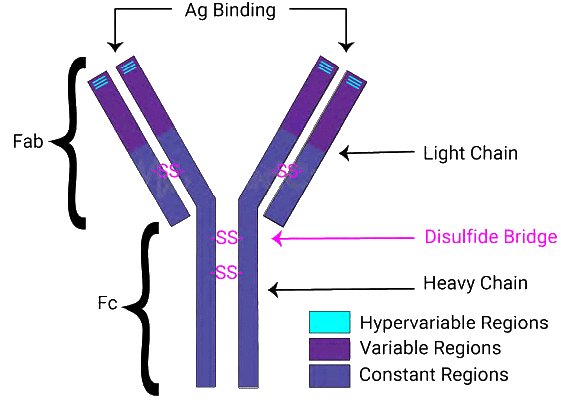UPSC Exam > UPSC Notes > Medical Science Optional Notes for UPSC > Immunoglobulins
Immunoglobulins | Medical Science Optional Notes for UPSC PDF Download
Classification of Immunoglobulins
Immunoglobulins, also known as antibodies, are glycoprotein molecules created by the immune system in reaction to an antigenic stimulus. They are present in blood, bodily secretions, or on mucous surfaces, and they attach to the specific antigen that triggered their production, thereby rendering it inactive.
Antibodies have two functional parts, the Fab region and the Fc region.

Fc region:
- Comprises the constant region.
- Originates from heavy (H) chains.
- Specifies the isotype (e.g., IgA, IgG, IgM).
- Links with complement (IgG, IgM).
- Attaches to diverse immunological cells, including macrophages, to induce phagocytic or cytotoxic activity.
- Encompasses the carboxy terminal.
- Possesses numerous carbohydrate side chains.
Fab region:
- Encompasses the variable/hypervariable region.
- Arises from both light (L) chains and heavy (H) chains.
- Identifies and attaches to antigens.
- Establishes the idiotype, uniquely specific to a single antigen.

Question for ImmunoglobulinsTry yourself: Which region of antibodies attaches to diverse immunological cells and induces phagocytic or cytotoxic activity?View Solution
Mechanism of Action - Immunoglobulins

The document Immunoglobulins | Medical Science Optional Notes for UPSC is a part of the UPSC Course Medical Science Optional Notes for UPSC.
All you need of UPSC at this link: UPSC
|
7 videos|219 docs
|
FAQs on Immunoglobulins - Medical Science Optional Notes for UPSC
| 1. What are immunoglobulins and how do they classify? |  |
Ans. Immunoglobulins, also known as antibodies, are proteins produced by the immune system in response to foreign substances called antigens. They can be classified into five main classes: IgG, IgA, IgM, IgD, and IgE.
| 2. What is the mechanism of action of immunoglobulins? |  |
Ans. The mechanism of action of immunoglobulins involves several processes. They can directly neutralize antigens by binding to them, preventing them from causing harm. They can also activate the complement system, a group of proteins that work together to destroy pathogens. Additionally, immunoglobulins can bind to antigens and tag them for destruction by other immune cells.
| 3. How do immunoglobulins play a role in the immune response? |  |
Ans. Immunoglobulins play a crucial role in the immune response by recognizing and binding to specific antigens. This binding triggers a cascade of immune responses, including the activation of other immune cells and the initiation of inflammatory processes. They help in the clearance of pathogens and provide long-term immunity through memory B cells.
| 4. What are the functions of different classes of immunoglobulins? |  |
Ans. Different classes of immunoglobulins have distinct functions. IgG is the most abundant class and provides long-term immunity by neutralizing toxins and pathogens. IgA is found in body secretions and helps prevent pathogens from entering the body. IgM is the first antibody produced in response to an infection and activates the complement system. IgD is involved in the activation of B cells, and IgE is responsible for allergic reactions.
| 5. How are immunoglobulins used in medical treatments? |  |
Ans. Immunoglobulins are used in medical treatments for various conditions. They can be administered as intravenous immunoglobulin (IVIG) to boost the immune system in individuals with immune deficiencies. IVIG is also used in the treatment of autoimmune disorders and certain infections. Monoclonal antibodies, a type of immunoglobulin, are used in targeted therapies for cancer and other diseases.

|
Explore Courses for UPSC exam
|

|
Signup for Free!
Signup to see your scores go up within 7 days! Learn & Practice with 1000+ FREE Notes, Videos & Tests.
Related Searches
















